Trump’s Trade War Turns Vietnamese Furniture Maker Into a Winner

While the U.S. and China both scramble to limit losses in their ongoing trade war, Vietnam’s Le Duy Anh is adding to his winnings.
Anh is chief executive officer of Xuan Hoa Vietnam Joint Stock Co., a furniture company based outside of Hanoi, which has received an influx of international visitors recently. On the back of U.S.-China tariffs on $360 billion in goods last year, Xuan Hoa clients — including Swedish furniture giant Ikea — have re-directed some production from China to Vietnam. At least 10 new prospective clients came calling at Anh’s office from abroad in just the first three months of the year.
“The trade war is bringing more business, for sure,” said Anh, who expects sales to at least double in the next five years. “There are more companies getting in touch with us to switch from China to our products.
Low Cost
“Like any other growing, global company, Ikea is always seeking competitive opportunities in order to secure optimal sourcing to keep costs low for our customers,” Mattias Hennius, a spokesman for Ikea in Sweden, said in an email, without addressing its expanding business with Xuan Hoa specifically.
Vietnam’s appeal rests in part on its reputation as a low-cost location. A factory worker in Vietnam is paid about half of what his peer gets in China, while electricity is cheap because of government subsidies. Vietnam shares a land border with China, which makes it cheaper and easier for factories to source materials and components for manufacturing.
The trade war is accelerating a trend that’s been steadily growing since Vietnam began opening its economy under so-called “doi moi” reforms in the 1980s. The economy has evolved into one of the most trade-dependent ones in the world with a dozen signed free-trade agreements.
Cash Chunk
Foreign direct investment has steadily increased since then, but really took off in 2014 after Samsung Electronics Co. announced plans to shift production of its smartphones from China to cushion its profits. FDI reached $14.1 billion in 2017, making up one-fifth of all inflows into the region, excluding Singapore, according to data compiled by Maybank Kim Eng Research Ltd.
“It’s not just a new toy for people to play with — it’s a shiny new toy,” Adam Sitkoff, executive director of the American Chamber of Commerce in Hanoi, said of investor enthusiasm in Vietnam.
Vietnam has made strides in the World Bank’s Ease of Doing Business gauge and the World Economic Forum’s Competitiveness Index, and debuted this year at No. 60 in the Bloomberg Innovation Index.
The trade war has acted as an added nudge for businesses to pull the trigger on their Vietnam expansion plans. Apple Inc. supplier GoerTek Inc. of China, and Taiwanese giant Hon Hai Precision Industry Co., known also as Foxconn, as well as some of its rivals have all made moves into the Southeast Asian country amid the trade war. American home furnisher Haverty Furniture Cos Inc. also is ramping up production in Vietnam, citing tariff pressures.
It’s showing up in the export numbers too, with Vietnam’s shipments holding up as trade elsewhere takes a knock. Exports rose 12.4 percent in the second half of 2018 from a year ago, outpacing the five biggest economies in Southeast Asia, according to data compiled by HSBC Holdings Plc.
‘Favorable’ View
Investors say Vietnam still has much work to do to improve its business environment: rooting out corruption, improving and expanding infrastructure, especially for transport, and making sure manufacturing can move steadily up the value chain.
Like Southeast Asia’s five biggest economies, Vietnam counts China as its top trading partner, making it difficult for the nation to choose sides in a trade war. But for Anh and an overwhelming majority of his fellow Vietnamese, there’s a clear bias toward the U.S.
Vietnam tops the list among countries whose residents hold an “unfavorable” opinion of China, at 88 percent versus No. 2 Japan at 83 percent, according to the Spring 2017 Pew Global Attitudes Survey. Vietnamese affections for the U.S. — 84 percent hold “favorable” opinions of the country — rank behind only that of U.S. citizens for their nation, the data show.
For a country that suffered a decades-long, brutal war against the U.S., referred to domestically as “the American War,” Vietnamese enthusiasm to see the U.S. as a partner underlines their ambition as an open, internationally connected economy.
Ha Van Thanh, an assembly worker who’s been with Xuan Hoa for 22 years, said he doesn’t follow the trade-war news much, but sees the benefits for Vietnam.
“I believe it’s quite good for Vietnam to do business with the U.S. as well as the U.S. to work with us because many of our products can compete well with Chinese products,” he said. “The U.S. is a good market which we can supply.”
Source: https://www.bloomberg.com/news/articles/2019-04-11/trump-s-trade-war-turns-vietnamese-furniture-maker-into-a-winner
By Michelle Jamrisko and Nguyen Dieu Tu Uyen